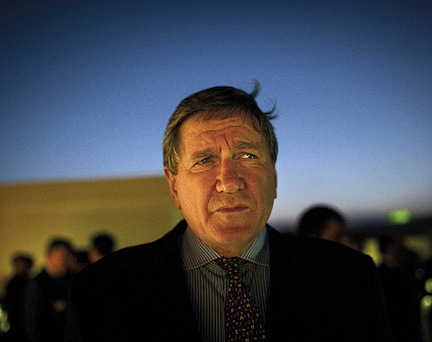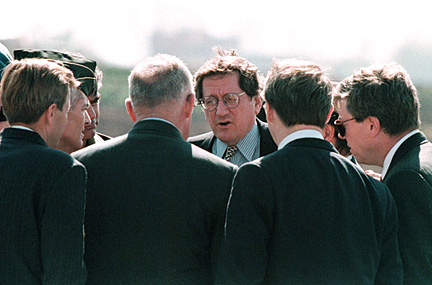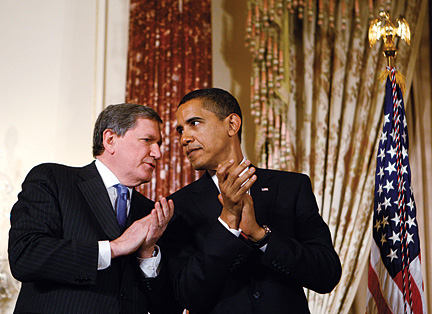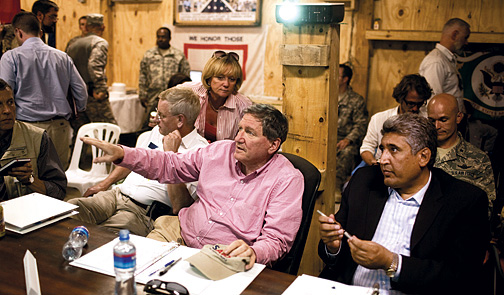He was sometimes known as Raging Bull for the negotiating style he developed over a diplomatic career that began during the early 1960s in Vietnam and ended while he was laboring to find a peaceful end to the conflicts in Afghanistan and Pakistan. Richard Holbrooke '62, the most important diplomat of his generation and one of the most influential in U.S. history, died suddenly on December 13 of last year from a ruptured aorta. He was sixty-nine. After his death, President Obama said, "America is more secure—and the world is a safer place—because of the work of Ambassador Richard Holbrooke."

His interest in foreign affairs may have begun when he was eight years old and his parents, Jews who had fled the Nazis in the 1930s, took him to visit the United Nations in New York City. "These buildings, my father said, would become the most important in the world," Holbrooke later recalled. "They would prevent future wars." At Brown, where he majored in history with an emphasis on European studies, he was a journalist with an interest in international matters. He played freshman tennis, belonged to the Sphinx Club (organized in 1904 for discussing the day's intellectual topics), and was a member of Phi Delta Epsilon.
Holbrooke wrote often for the Brown Daily Herald, of which he became editor-in-chief. Fluent in French, he spent two undergraduate summers in France. In April of his sophomore year, he left school early to travel to Paris for the BDH to cover the so-called Big Four Peace Summit, whose purpose was to resolve the status of Berlin. While in Paris, he also helped the New York Times staff cover the events, an experience he later described in the BDH. In 1997, the University awarded him an honorary degree, and ten years later brought him back to campus as a professor-at-large based at the Watson Institute.
Inspired by President Kennedy's inaugural call to public service, Holbrooke joined the Foreign Service right after graduation. He was sent to Vietnam, where he became a staff assistant to several top military and diplomatic officials, including Ambassadors Maxwell Taylor and Henry Cabot Lodge. In 1966, he moved to the White House to work on President Johnson's Vietnam staff. While there, he authored a volume of the Pentagon Papers.

After the election of President Reagan, Holbrooke found himself outside government. He worked on Wall Street, where he became a managing director at Lehman Brothers. Later, between government stints, he worked at Credit Suisse First Boston and Perseus.
President Clinton brought Holbrooke back to the state department in 1994, when he appointed him assistant secretary of state for European and Canadian Affairs. The next year Clinton named him a special mediator to end the war in the Balkans. Later in 1995, after three relentless weeks of sometimes brutal negotiation with the presidents of Croatia, Serbia, and Bosnia at Wright-Patterson Air Force Base in Dayton, Ohio—Holbrooke insisted, despite much criticism, that all sides should negotiate together, despite the ethnic cleansing conducted by the Serbs—Holbrooke emerged with the General Framework Agreement for Peace in Bosnia and Herzegovina: the Dayton Peace Accords. In his book To End a War, Holbrooke wrote that the conflict "was the product of bad, even criminal, political leaders who encouraged ethnic confrontation for personal, political, and financial gain." In Pristina, Kosovo, a few years later, a bar was named in his honor. It was called Tricky Dick's.

Holbrooke, whose first wife was Larrine Sullivan '63, is survived by his third wife, Kati Marton. He also leaves behind his two children with Sullivan, David and Anthony.
The Negotiator
When Serbs imprisoned a young war correspondent for exposing a massacre, only one diplomat was persuasive enough to set him free.
By David Rohde '90
In 1995, Richard Holbrooke was forced to get to know my family and me in a way I never intended. That year, Serbian police arrested me for finding and reporting on mass graves containing the remains of 8,000 massacred Muslims near the town of Srebrenica. Days later, my editors and family arrived at peace talks Holbrooke was hosting in Dayton, Ohio, to end the war in Bosnia. They demanded that Holbrooke win my release. A week later, he did. Under unrelenting pressure from him and his wife, the journalist Kati Marton, Serb officials released me after ten days in captivity.
Over the next seven years, Holbrooke—widely known for his brusque manner—teased me about complicating his already vexing Balkan negotiations. I also began to see a pattern. Holbrooke's diplomacy was often driven by the individuals he met, from innocent civilians in Bosnia to victims of AIDS in Africa. Impatient with Washington's plodding pace, he relished being in the field and focused on pragmatic solutions.
In 2003, Holbrooke and Marton met with me in India while I was covering South Asia for the New York Times. Now outside government, he was the head of the Global Business Council on HIV/AIDS. He ribbed me about Bosnia, but he also passionately described the massive threat AIDS posed to South Asia and the world. His trademark intensity had found a new cause.
We met again two years later, when we discussed the situation in Afghanistan and Pakistan over lunch. I began to notice that each time we saw each other over the years, the references to Bosnia lessened and the substance grew.
In 2008, my then-fiancée, Kristen Mulvihill '91, and I sat next to Holbrooke and Marton at a friend's wedding. Holbrooke was more welcoming and warm than I had ever seen him. At the reception, I told him I was on my way to Afghanistan for a reporting trip. He jokingly told me not to get kidnapped.
Then, on November 10, 2008, a Taliban commander who had invited me to an interview outside Kabul abducted me. Again, my family and Kristen, who was now my wife, pressured Holbrooke to win my freedom. Again, Holbrooke sprang into action.
He asked Pakistani military officials to pressure the Taliban group that had abducted me—the Haqqani network—to release me. Nothing happened. In 1995, Holbrooke was able to cajole the Serbians into freeing me. But in 2009 the Pakistani generals failed to act. After seven months in captivity, I escaped with an Afghan colleague.
To me, Holbrooke's struggles in the region represent the waning of American influence from the high of post–Cold War Bosnia to the muddle of the war on terror in Afghanistan and Pakistan. In the Balkans of the 1990s, American-led air strikes were seen as devastatingly effective, and the conflict had clear front lines. In the Afghanistan and Pakistan of today, conventional American military power cannot defeat the Taliban as long as the Pakistani military grants it a safe haven in Pakistan. No diplomat—even the larger-than-life Holbrooke—can overcome that dynamic.
After my return home, I expected Holbrooke to castigate me for yet again complicating his diplomatic efforts. But the teasing was gone, replaced instead by a drive to understand his adversaries and their motivations in this new war. Holbrooke spent hours asking me about the Taliban. A man known for tirelessly voicing his opinions sat and quietly listened.
Each time I met Holbrooke over the years he seemed to soften. The at-times overbearing Holbrooke of Bosnia faded, replaced by a more pensive and probing man. The passage of time may have mellowed Holbrooke. Or the increasingly intractable diplomatic challenges he faced may have humbled him. Either way, the Holbrooke of 2010 was a generous friend and passionate public servant.
David Rohde is an investigative reporter with the New York Times and coauthor, with his wife, Kristen Mulvihill '91, of A Rope and A Prayer: A Kidnapping from Two Sides.
The Friend
Remembering thirty-six years of friendship with a man who could be both dramatic and warm.
By Steven Rattner '74
Richard Charles Albert Holbrooke '62 (the Albert would later disappear) loved his wife, his family, his friends, his country, his work—and Brown. In the course of our thirty-six-year friendship, rare was the extended conversation in which he didn't circle around to our shared alma mater, always with fondness.
He arrived at Brown at seventeen—precocious as always—fresh from Scarsdale (N.Y.) High School and with the help of an Alfred P. Sloan Scholarship. At Brown, he played on the freshman tennis team and joined the Outing Club as well as the Sphinx Club, an organization devoted to discussing "intellectual problems." He must have loved those meetings!
But within the Brown constellation, Richard had specific affection for the Brown Daily Herald, of which, like me, he served as editor-in-chief. Back then, we thought it was the best job we would ever have; for both Richard and me, it played a key and lasting role in our futures.
As BDH editor, he exuded the youthful idealism and occasional intemperateness that characterized many student journalists (myself included). "The Administration of Brown University is still, needlessly, almost wholly out of touch with the student body, and often badly out of touch with itself," he pronounced in a May 1962 speech that was given lavish coverage in the Herald.
Richard was never accused of being out of touch; he was, in fact, incessantly in touch with everyone, from the lowly and the young—whom he adored mentoring—to the mighty, whose relationships he valued.
I first met him in 1974, when, as a newly minted Brown graduate and lowly news clerk in the Washington bureau of the New York Times, I summoned the chutzpah to seek him out. Even then, Richard loomed large in Washington.
Following his graduation from Brown and inspired by President Kennedy, he had joined the Foreign Service and was quickly dispatched to Vietnam, which became a transformational experience for him. He saw the futility of war firsthand, as part of the U.S. delegation to the Paris peace talks and as author of a volume of the Pentagon Papers.
The war behind him, Richard spent two years as the Peace Corps director in Morocco and then became managing editor of Foreign Policy. It was on this esteemed perch that I found him, still only in his early thirties. True to what I would later discover to be his form, he received me graciously, and we began what became a lifelong friendship. We didn't see a lot of each other in those early years—in the Carter administration he became the youngest assistant secretary of state for East Asian and Pacific Affairs in history—but my time with him was memorable.
In the early 1980s, our careers intersected at Lehman Brothers, where Richard had landed as a senior adviser after the demise of the Carter Administration and which I had joined as a junior associate in search of a new career. Ever true to his enveloping character, when Richard discovered me toiling away in the recesses of the firm, he promptly invited me to lunch. At the appointed moment, I appeared at his office and followed as he led the way. Suddenly, I realized that we were about to enter the partners' dining room.
"We can't go in there," I said nervously. "You're not a partner."
"They don't seem to mind," he responded nonchalantly. In we went. Either no one minded or no one knew that he wasn't a partner.
While he appreciated the financial security that he derived from working on Wall Street between Democratic administrations—he also did stints at First Boston and Perseus—Richard never understood why anyone would work in business other than for the money. To him, public service was the only meritorious calling.
Once Kati Marton became Richard's wife (she quickly changed his first name from Dick to Richard to give him a bit more gravitas) and Maureen White became mine, we grew to become fast friends, sharing dinners in Manhattan and summer weekends at the beach. As my boys grew older, Richard and I started a tradition of father-son ski weekends at his house in Telluride. His interest in my kids was heartwarming, and in return, they adored him.
He had a distinctive, dramatic way of speaking. Nearly every event was "the most extraordinary thing imaginable" or of "incalculable importance." Our kids were amused by this and we began speaking "Holbrookese" around our home. For a time during the Bush administration, Richard wrote a monthly column for the Washington Post, which reflected both his excellent training at the BDH and his colorful speech. Maureen and I would often read the more vivid passages to each other, adding the vocal points of emphasis that we knew he would have included.
Our purely personal friendship took on a professional element in mid-2009 when Maureen went to work on humanitarian issues in the Obama administration's "Af-Pak" group, which Richard headed as the SRAP (Special Representative to Afghanistan and Pakistan). Her affection for him as a friend expanded to include enormous respect for him as a professional. His energy was extraordinary; his commitment to trying to solve this terrible problem was unwavering; and his support of his team quickly made him a beloved figure. Notwithstanding the exhaustion of traveling with the indefatigable Holbrooke, Maureen loved their trips to the scarred region.
At a jammed memorial gathering at his New York apartment a few days after his death, I surveyed the multitude, sure that all couldn't possibly be genuine friends. But then, as I mentally moved from guest to guest, I realized that all of them were people with whom Richard had broken bread or shared memorable experiences or whose career he had worried over, as he had mine.
The reports from the hospital said that Richard's heart failed him, but that was not possible. His heart was his greatest strength.
After nearly nine years as a New York Times reporter and twenty-six in investment banking and private equity, Steven Rattner recently served as Counselor to the Secretary of the Treasury and lead auto adviser to President Obama.
The Mentor
Working for Holbrooke may have been the defining moment in many diplomatic careers.
By Jonathan Levitsky '90
I was flattered and more than a little intimidated when Richard Holbrooke called in the summer of 1999 to offer me a job at the U.S. Mission to the United Nations. I was able to get out no more than a sentence explaining I would be thrilled to join his team but wanted to agree on the details of the job first. "I'm going into a tunnel," he fibbed. "We're about to be cut off. See you at work!" Then he hung up. That was my first lesson from Richard: never let someone keep negotiating when he has already said yes.

Richard once sent me to Kosovo to try to persuade local Serb leaders to make a statement supporting reconciliation with the Albanian majority. It was not an easy task. Belgrade still hoped to hold on to its former province after NATO military action ended a decade of Serbian repression. The Serb minority was under intense pressure to resist any cooperation that could be viewed as conceding Kosovo's de facto independence. After hours of argument over tiny cups of strong coffee in the restive northern city of Mitrovica, we had a deal. I called the news in to Richard. We could do much better if we kept at it, he said. We kept negotiating, but struggled to make further headway. When Richard finally arrived, he strengthened the statement, pushed the gathered Serb leaders to go along with it, and quickly announced the news with them to the press waiting outside before the Serbs could change their minds. I was feeling bad about the inadequacy of my preparatory work until I noticed that Richard was complimenting it to everyone in earshot.
It was vintage Holbrooke. He gave us extraordinary opportunities, pushed us to do things we didn't think we could, and then gave us the credit, whether we fully deserved it or not. It is no wonder that a generation of American diplomats view the opportunity to have worked with him as the defining moment in their careers.
Jonathan Levitsky was Counselor to Ambassador Holbrooke at the U.S. Mission to the United Nations from 1999 to 2001. He is now a partner at the international law firm Debevoise & Plimpton LLP.
The Brown Recruiter
Holbrooke loved his alma mater so much he encouraged the daughter of a lifelong friend to go there.
By Catherine Karnow '82
I remember Dick Holbrooke from when I was a child. He'd first met my parents when he was twenty-two and working for the state department. We were living in Hong Kong, where my father, Stanley Karnow, was a reporter covering Vietnam. Dick and my father saw a lot of each other both in Vietnam and in Hong Kong.
We all remember when in 1963 Dick came with us to a dog show where our goofy cocker spaniel took home first prize, despite Dick's prediction the dog could never win anything.
In the 1970s my father was writing a weekly column for Newsweek International when he suggested that Dick write the column every other week. They collaborated closely in those couple of years.
My father says, "One thing that struck me was his absolute devotion to public service." Sometimes his public service could be unconventional, and different from the kind of aggressive diplomacy for which he became known. For example, after Dick returned from a stint as director of the Peace Corps in Morocco, my father asked, "So what were you doing over there?" Dick replied that he'd been coaching the Marrakech basketball team. It was typical of how he often got involved with everyday people, not just diplomats.
My father remembers attending the swearing-in ceremony when Dick became ambassador to Germany. Dick decided to make known at that moment that he was Jewish, revealing that his father had been a German Jew (his mother, Trudi, was also Jewish). He wanted the Germans to know. They were quite surprised at their new ambassador.
Several months ago, my father got a call at home. It was Dick phoning from Kabul. He said, "I've got someone I want you to talk to." It was General Stanley McChrystal, who was then commander of the U.S. forces in Afghanistan. General McChrystal asked, "Stanley, is there anything we learned in Vietnam that we can use in Afghanistan today?" My father replied, "What I learned in Vietnam is that we shouldn't have been there in the first place."
The last time my father talked to Dick was just a couple weeks before Dick's death. He called from Pakistan and talked of how difficult the situation was in Afghanistan.
My own fondest memory of Dick is from when I was applying to colleges. Knowing my character and personality, it was Dick who suggested I consider Brown. He loved Brown and encouraged me to apply. He told me it was the perfect place for smart, creative people who go against the grain. He even wrote one of my letters of recommendation. I will always be grateful to him for his encouragement, as my years at Brown were some of the best of my life.
Catherine Karnow is a photographer for National Geographic. Her father, Stanley Karnow, who covered the Vietnam War from the death of the first Americans in 1959 to the fall of Saigon in 1975, is the author of Vietnam: A History and was chief correspondent for the acclaimed PBS series Vietnam: A Television History.





